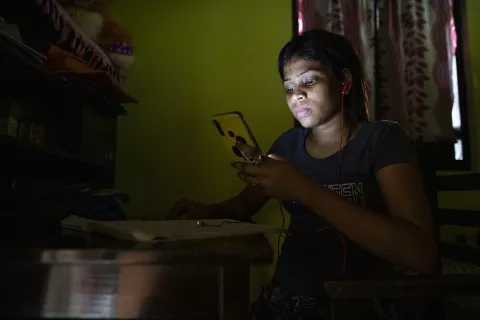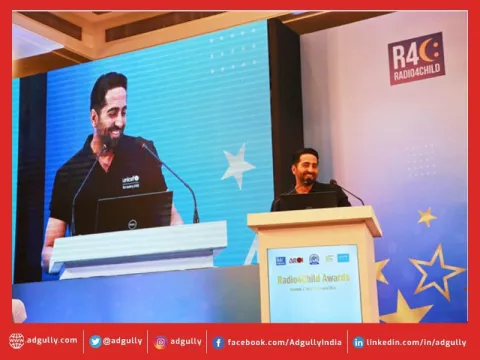Early learning during the coronavirus pandemic
Valuable tips and advice from the education expert at UNICEF South Asia

Early learning from home is a new challenge to both children and parents today. As part of the parenting month, Regional Education Adviser at UNICEF’s Regional Office for South Asia, Dr. Jim Ackers, answers some critical questions on parenting and supporting home-based learning for preschoolers at home. These questions were derived from the challenges expressed by ECCD facilitators in Bhutan who shared their stories from the field. Jim shares some valuable ideas to ensure quality learning experiences at home.
Why is it important to ensure that younger children (preschoolers) continue their early learning at home despite centre closures?
- Brain development is particularly rapid between the ages of 0-5 as this is the time that the brain develops most rapidly. Delays in development during this period can lead to lifelong consequences in terms of learning abilities.
- Certain skills are key to be imparted at that age, such as the fine hand motor skills needed to perform precise tasks like writing or building structures. So, for young children, it is very good to have some rough paper at home which can be used by children who can practice holding pens/pencils and start scribbling.
- For pre-primary school children: It maintains a daily routine around learning and discovery and being curious about the world. It also builds confidence in the child as the child can progress with support from parents and caregivers. With individual attention, repetition and encouragement, individual learning gains can actually be quicker at home than in class.
- Being confined restricts opportunities for early stimulation such as exposure to outside environments and others, especially other children. So, it is important to compensate by playing with children inside and when confinement rules are relaxed, to interact with them outside as well and encourage them to ask questions around what they see, hear, feel, smell outside, and encourage social interaction and play with other children.

What advice would you give ECCD facilitators on how to support remote learning, despite challenges such as illiterate parents or parents without smart phones?
- For all parents: It is good to understand what their children are supposed to learn and the type of tasks that their children should be able to perform by a certain age so that they feel they are a part of their child’s development; also so that they are aware if their child may have a learning impairment where expert support may be needed. So, communicating on specific learning goals would be very useful. This can be through different channels: the ECCD WhatsApp groups of course, but also national TV or radio, and printed home-learning packs if they have no access to computers, TV or radio. Checklists of learning goals can help parents track and monitor their children’s progress. It’s important that the guidance should be in a language that the parent understands, but ECCD learning goals, can also be explained with simple icons and drawings that illiterate parents understand.
- For all parents: It is good to recommend daily routines for learning. It would therefore be useful for ECCD facilitators to recommend a weekly plan of activities to be completed.
- It’s also important for both parents to engage with the children wherever possible. Fathers can play a key role in educating their children as well as mothers. Equally it is important that the parents give equal attention to their girls and boys.
- For very young learners, language acquisition can focus on things around the child, such as family members and names, the home environment, animals, colours, etc. More abstract concepts should come later.
- Watching educational videos can help learning and these can be shared through mobile phones, as well as national TV.
- For illiterate parents with no access to TV or smart phones, home-learning packages can be explained face to face by ECCD facilitators, with physical distancing. They can go through the printed materials with parents and explain the tasks and how they should approach them.

What fun and simple activities can parents do to make learning fun for children?
- This, of course, depends on the age of children. For very young toddlers, all routine interactions should be considered as opportunities to develop physically and to learn and show care for others. Eating, bathing, changing, getting dressed, learning how to hold objects, and give or take from others: many of these routine activities can be turned into fun and games and they are all an opportunity for language acquisition. Children learn much before they can speak; recognizing sounds and attaching them to meaning is an important stage. This is why parents repeating certain sounds can be helpful for the child.
- Routine activities can be transformed into games, like washing hands: for example. This is very important at the time of COVID-19 and there are several examples.
- Games and activities focusing on building things is important for motor skills and other skills, using simple household and outdoor objects. These objects can help children create stories. Parents can take part in storytelling and encourage their children to represent characters, actions etc., using whatever props are available in their immediate environments.
- Finding and hiding things is stimulating for children even from an early age. When they get older the game can be made more interesting if children are encouraged to ask questions or respond to clues so that they can solve a problem.
- Reading to children, or inventing stories for them is highly recommended as it helps develop listening and comprehension skills and vocabulary. I used to make up many stories when my children were young – sometimes using ideas that they gave me or including characters that wanted to appear in the story. Children should also be encouraged to ask questions, tell a story themselves, or add to the story. This is a good way to establish as a routine, such as at bedtime. Story telling can also be fun as a family group activity.

Some parents say that it is difficult to teach young children at home. Some prioritize the learning of older children over preschoolers. What are some of the simple parenting strategies to cope with the learning needs of different aged children in the family.
- Each child should be given enough individual attention, and care should be given not to give preferential treatment to any child over another, including in terms of time given. But younger children may often need more support than those who have already developed foundational skills and can work more autonomously.
- Older children are normally able to study for longer periods than younger learners. Younger children largely learn through play, but play can be structured. Also, parents can encourage autonomy from an early age, by asking young children for example to ‘draw me a dog’ or copy these words and then come to see me. However, even a lot of those older ECCD children will still need a lot of guidance and supervision, and therefore parents/carers need to establish routine schedules that are individual for each of their children to ensure that each child has enough time, with support, to go through a daily schedule of learning activities.
- Younger children on the other hand, may need more support for some activities, but the structured learning sessions should be short ideally and within a daily routine.
- If there are several children within the household, older brothers and sisters can help their younger siblings with their learning, especially if they involve educational games that they can participate in. Older siblings will also learn through teaching their younger siblings. If you want to test if you understand a concept, try teaching it to others.
- Playing very simple games as a whole family with young children can be a fun way to learn. For the youngest children, those game times are learning opportunities through listening, understanding what the objective of the game is, practicing balance or motor skills and language skills depending on the nature of the game. Having fun and playing games as a family is a perfect way to relieve any existing anxiety and stress.

How many hours a day or week should I ensure that my child is engaged in a meaningful learning activity?
- It’s hard to give a number, much depends on age, and much can be learned through non-structured activities, such as talking naturally as a family. ECCD facilitators should be able to recommend the number of minutes or hours spent per school day on various types of learning activities, so that parents know approximately what their child should be experiencing if schools were open. As when children are at school it is also important not to exceed the time they spend working on specific learning activities.
- While much is learned naturally through daily interaction with parents, if the household gives time for this there should also be structured learning time to establish habits and routines, without being distracted. Such structured learning time should ideally be scheduled at fixed times daily.
- Learning should also include physical activities so that children develop well physically. It is not good if children sit around at home. They can become overweight, especially if they are not eating nutritious food. There are many games that can be played. If a ball is included children can learn skills like catching and kicking the ball.
- It is also good to encourage young children to engage in a variety of different tasks rather than asking them to do too many repetitive tasks. Some repetition may be useful, e.g. in early writing skills. Children’s learning preferences will also vary and it’s important to encourage children to learn in a way that they enjoy. Indeed, I cannot overstress how important it is for the child to feel that learning should be fun from the beginning because if a young child enjoys learning from an early age, he or she will enjoy learning for life.

UNICEF Bhutan thanks Regional Education Advisor for South Asia Dr Jim Ackers and Education Specialist (Economist) Ivan Coursac for supporting the team with the article.




